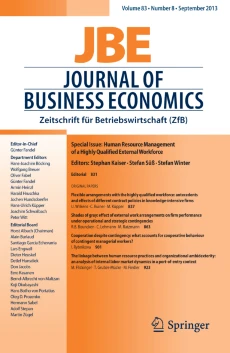Compared to other disciplines of business studies, sustainability management is still a relatively young
research field. Nevertheless, for the past three decades, multiple frameworks have been proposed,
offering sustainability management researchers a wide variety of theoretical and conceptual anchor
points. The most prominent frameworks include reference frameworks such as the planetary
boundaries concept (Rockström et al. 2009; linked to the company level see e.g. Whiteman et al. 2009)
and the SDGs (UN 2015; linked to the company level, see e.g. Schaltegger et al. 2018). Other
frameworks offer approaches such as corporate citizenship (Carroll 1998), creating shared value
(Porter and Kramer 2011), CSR (McWilliams et al. 2006), business cases for sustainability (Schaltegger
and Burritt 2018), the multi-level perspective (Geels 2011), or the circular economy (Ellen McArthur
Foundation 2013; Urbinati et al. 2017). Theoretical frameworks from business studies comprise, for
example, stakeholder theory (Hörisch et al. 2014), dynamic capabilities (Rebs et al., 2019), or the
endeavors to create distinct theories of sustainability management (Starik and Kanashiro, 2013;
Dyckhoff, 2018).
These and further frameworks are used by sustainability management researchers and all have their
merits and limitations. Yet, their respective potential to contribute to sustainable development differs.
With this special issue, we aim to stimulate the discussion on how such frameworks enable companies
to contribute to sustainable development on a societal level. We invite submissions that apply, further
develop or compare frameworks for sustainability management and specify how a given framework is
(un)able to contribute to corporate sustainability and sustainable development.
We seek quantitative and qualitative empirical investigations of corporate and entrepreneurial efforts
to specific sustainability challenges, using the perspective of a selected framework. Conceptual
contributions are also welcome and should focus on the combination or comparison of the potential
contributions of different frameworks. With this approach, we hope to stimulate a discussion about
the potential strengths and weaknesses of current frameworks used in sustainability management
research, and to encourage a deeper understanding of how sustainability management research could
be further developed for the next decades.
Issues addressed in submissions could include, but are not limited to:
- Quantitative analyses of businesses contributions to pressing sustainability challenges, using
selected frameworks of (sustainability) management research.
- Qualitative studies of sustainability management endeavors following the rational of a
selected framework.
- Conceptual analyses, combining, or comparing frameworks of sustainability management
research.
- The applicability of frameworks of sustainability management research in different contexts
(e.g. with regard to different company sizes or different pressing sustainability challenges).
- Literature reviews on frameworks of sustainability management research.
- The ability of different frameworks of sustainability management research to contribute to
sustainability transitions on a societal level.
- The ability of different sustainability management research frameworks to contribute to
radical sustainability oriented innovations.
- The suitability of frameworks to accommodate or address accelerating climate and resource
pressures.
- The applicability of different frameworks of sustainability management research at the
intersection between sustainability management and other disciplines of business studies (e.g.
accounting, business ethics, entrepreneurship, finance, human resource management,
innovation, leadership, logistics and supply chain management, marketing, operations
research, production, strategy).
- …
Time schedule
Contributors with ideas for papers are invited to communicate with the editors before submission.
Please contact hoerisch@leuphana.de. The following schedule will be applied:
- Submission of papers: October 31, 2021
- Initial decisions made and authors informed: January 15, 2022
- Deadline for last paper revisions for consideration in the special issue: July 31, 2022
- Final decisions made: September 15, 2022
- Publication of special issue: end of 2022/beginning of 2023
Contributions
Full papers are invited to be considered for publication in the journal’s special issue. The
recommended manuscript length for Journal of Business Economics is a maximum of 30 pages (450
words a page, Times New Roman, 11 pt., single space). Paper submissions should follow the editorial
guidelines of the "Journal of Business Economics", which can be obtained from the website
(https://www.springer.com/journal/11573/submission-guidelines). Please send your submissions via
https://www.editorialmanager.com/jbec/default.aspx.
References
Carroll AB (1998) The four faces of corporate citizenship. Business and Society Review 100:1–7
Dyckhoff H (2018) Multi-criteria production theory: foundation of non-financial and sustainability
performance evaluation. Journal of Business Economics 88:851–882.
Ellen Mc Arthur Foundation (2013). Towards the circular economy. Available at:
www.ellenmacarthurfoundation.org/assets/downloads/publications/Ellen-MacArthur-
Foundation-Towards-the-Circular-Economy-vol.1.pdf.
Geels FW (2011) The mulit-level perspective on sustainability transitions: Responses to seven
criticisms. Environmental Innovation and Societal Transitions 1:24–40
Hörisch J, Freeman RE, Schaltegger S (2014) Applying Stakeholder Theory in Sustainability
Management: Links, Similarities, Dissimilarities, and a Conceptual Framework. Organization &
Environment 27:328–346.
McWilliams A, Siegel DS, Wright PM (2006) Corporate Social Responsibility: Strategic Implications. J
Management Studies 43:1–18.
Porter M, Kramer M (2011) Creating Shared Value. Harvard Business Review 94:62–77
Rebs T, Thiel D, Brandenburg M, Seuring S (2019) Impacts of stakeholder influences and dynamic
capabilities on the sustainability performance of supply chains: a system dynamics model. Journal
of Business Economics 89:893–926.
Rockström J et al. (2009) A safe operating space for humanity. Nature 461:472
Schaltegger S, Beckmann M, Hockerts K (2018) Sustainable entrepreneurship: creating environmental
solutions in light of planetary boundaries. International Journal of Entrepreneurial Venturing
10:1–16
Schaltegger S, Burritt R (2018) Business cases and corporate engagement with sustainability:
Differentiating ethical motivations. J Bus Ethics 147:241–259
Starik M, Kanashiro P (2013) Toward a Theory of Sustainability Management: Uncovering and
Integrating the Nearly Obvious. Organization & Environment 26:7–30
United Nations (2015) Transforming our world: the 2030 Agenda for Sustainable Development.
Resolution adopted by the General Assembly on 25 September 2015, New York.
http://www.un.org/ga/search/view_doc.asp?symbol=A/RES/70/1&Lang=E. Accessed 2 March
2017
Urbinati A, Chiaroni D, Chiesa V (2017) Towards a new taxonomy of circular economy business
models. Journal of Cleaner Production 168:487–498
Whiteman G, Walker B, Perego P (2013) Planetary Boundaries: Ecological Foundations for Corporate
Sustainability. Journal of Management Studies 50:307–336.







